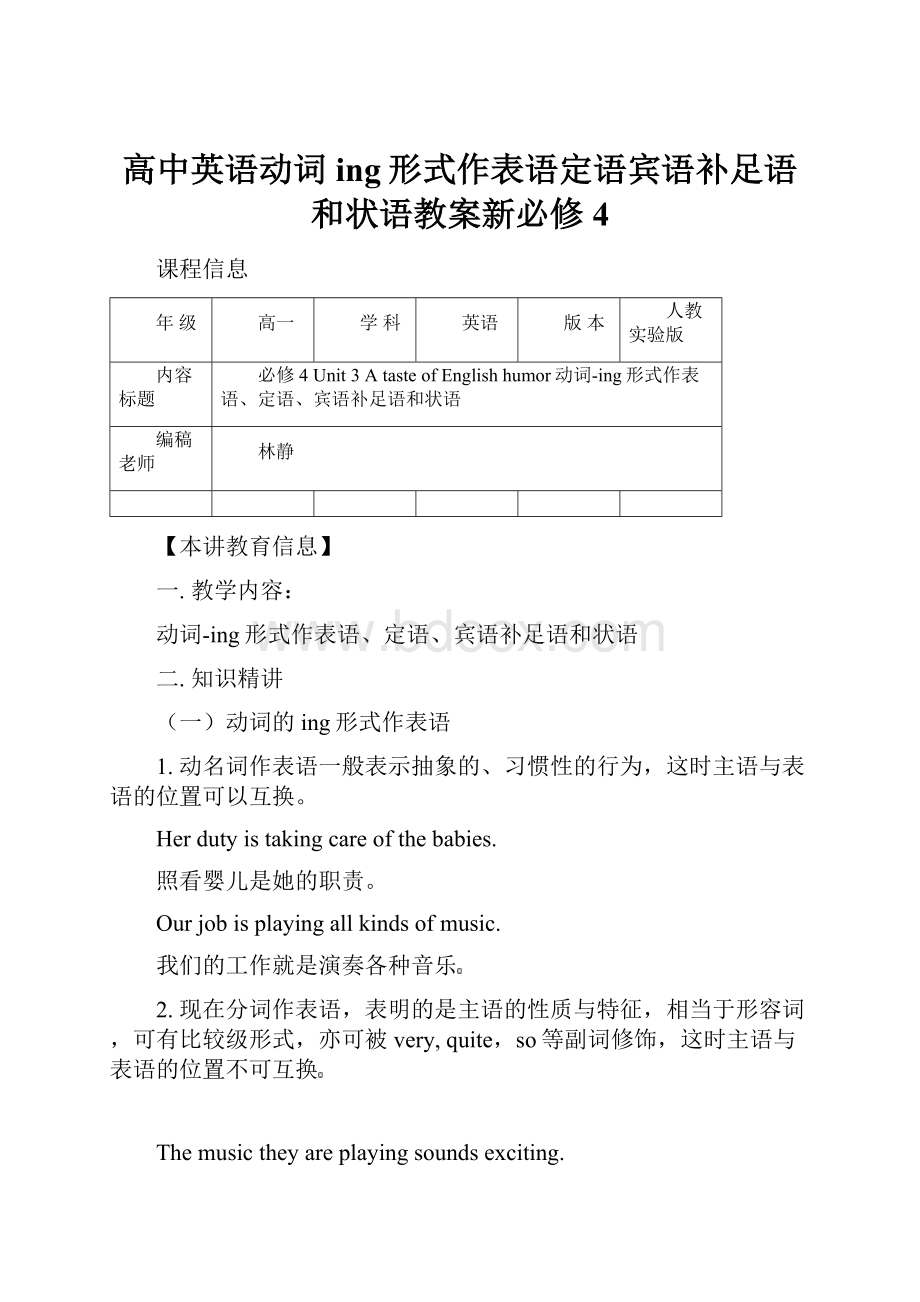高中英语动词ing形式作表语定语宾语补足语和状语教案新必修4.docx
《高中英语动词ing形式作表语定语宾语补足语和状语教案新必修4.docx》由会员分享,可在线阅读,更多相关《高中英语动词ing形式作表语定语宾语补足语和状语教案新必修4.docx(20页珍藏版)》请在冰豆网上搜索。

高中英语动词ing形式作表语定语宾语补足语和状语教案新必修4
课程信息
年级
高一
学科
英语
版本
人教实验版
内容标题
必修4Unit3AtasteofEnglishhumor动词-ing形式作表语、定语、宾语补足语和状语
编稿老师
林静
【本讲教育信息】
一.教学内容:
动词-ing形式作表语、定语、宾语补足语和状语
二.知识精讲
(一)动词的ing形式作表语
1.动名词作表语一般表示抽象的、习惯性的行为,这时主语与表语的位置可以互换。
Herdutyistakingcareofthebabies.
照看婴儿是她的职责。
Ourjobisplayingallkindsofmusic.
我们的工作就是演奏各种音乐
2.现在分词作表语,表明的是主语的性质与特征,相当于形容词,可有比较级形式,亦可被very,quite,so等副词修饰,这时主语与表语的位置不可互换
Themusictheyareplayingsoundsexciting.
他们演奏的音乐是如此令人兴奋
Thefilmwesawlastnightisquitemoving.
我们昨晚看的电影十分感人。
(二)动词的ing形式作定语
1.动名词作定语,表示该名词的用途或与其有关的动作,通常只能放在所修饰的名词前。
awalkingstick手杖readingroom阅览室washingmachine洗衣机
2.现在分词作定语,说明所修饰的名词正在进行的动作或存在的状态,现在分词与所修饰的名词具有逻辑上的主谓关系,可换成定语从句来表达,单个的现在分词作定语常置于被修饰的名词前,现在分词短语作定语须置于被修饰的名词后。
Nobodycanstoptherunninghorse(=thehorsethatisrunning).
没人能阻止那匹奔跑的马。
Thestudentmakingtheexperiment(=whoismakingtheexperiment)isourmonitor.
正在做实验的那个学生是我们的班长。
(三)动词-ing形式作宾语补足语
动词-ing形式作宾语补足语表示动作正在进行,这时宾语与宾补之间构成主谓关系,主要用于以下两类动词之后:
1.表示感觉和状态的动词,如see,hear,feel,smell,watch,find,notice,catch,observe等。
Ifeltsomeonepattingontheshoulder.
我感到有人拍了拍我的肩膀
Icaughtastrangerslidingintothemanager’soffice.
我无意中发现一个陌生人溜进了经理的办公室。
2.表示“指使”等意义的动词,如have,set,keep,get,leave等
Doyouthinkyoucangettheradioworking?
你认为你能修好这台收音机吗?
I’msorrytohavekeptyouwaitinglong.
对不起,让你久等了
知识拓展:
感官动词和使役动词后,除用动词-ing形式作宾语补足语外,还可以用省略to的不定式(强调动作的完成,指全过程)及过去分词(宾语与宾补之间构成被动关系)作宾补。
Isawthethiefgetonthetrainanddisappeared.
我看见那个贼上了火车,消失了。
TherewassomuchnoiseinthehallthatIcouldn’tmakemyselfheard.
大厅里太嘈杂了,我说话的声音无法被别人听到。
即学即用:
1.Ifasolution________theriversagainstpollutionisfound,thenourlivingsurroundingswillbeimproved.
A.toprotectB.protectingC.toprotectingD.protect
2.Thewildflowerslookedlikeasoftorangeblanket_____thedesert.
A.coveringB.coveredC.coverD.tocover
3.Helookedaroundandcaughtaman_____hishandintothepocketofapassenger.
A.putB.tobeputC.toputD.putting
4.________togiveupsmoking,hethrewawayhis________cigarettes.
A.Determined;remained B.Determined;remaining
C.Determining;remained D.Determining;remaining
5.Thehouses________bythefirstcompanywillbecompletedbytheendofthisyear.
A.beingbuilt B.builtC.tobebuilding D.tobuild
6.Hewasdeeply_______becausethestoryis____________.
A.moved;movedB.moving;moving
C.moved;movingD.moving;moved
(四)现在分词(短语)(动词-ing形式)作状语
1.现在分词(短语)作状语时,分词的逻辑主语必须是句子的主语,分词必须和句子的主语构成逻辑上的主谓关系。
现在分词作状语可以表示动作发生的时间、原因、条件、结果、让步或伴随情况等。
(1)表示时间,作时间状语,相当于时间状语从句,有时可以在动词-ing形式前加一个表示时间的连词,如when,while等。
Turningaway(=Whensheturnedaround),shesawacardrivingup.
转过身来,她看见一辆车开过来了。
Whileshopping(=WhileIwasshopping)inthesupermarket,Imetanoldfriendofmine.
在超市购物时,我碰到了一个老朋友。
Havingfinished(=Afterhehadfinished)thehomework,Henrywenthome.
完成作业后,亨利就回家了。
(2)表示原因,作原因状语,相当于原因状语从句。
Notknowinghistelephonenumber(=SinceIdidn’tknow…),Icouldn’tgetintouchwithhim.
由于不知道他的电话号码,我无法和他取得联系。
HavinglivedinLondonformanyyears(=BecauseIhavelived…),Ialmostknoweveryplacequitewell.
在伦敦住过多年,我几乎对每个地方都很熟悉。
(3)表示结果,作结果状语,相当于结果状语从句。
通常放在句末,中间有逗号隔开,表示一种自然的、顺理成章的结果。
Thefirelastednearlyamonth,leavingnothingvaluable(=andleftnothingvaluable).
大火持续了近一个月,几乎没剩下有用的东西。
Hisparentsdiedintheaccident,leavinghimanorphan.
他的父母在车祸中丧生,以致他成了孤儿。
(4)表示条件,作条件状语,相当于条件状语从句。
Beingmorecareful(=Ifyouaremorecareful),youcanmakefewermistakes.
如果你更细心点,就会少犯错误。
Workinghard(=Ifyouworkhard),youwillsucceed.
努力工作,你会成功的。
(5)表示让步,作让步状语,相当于让步状语从句,有时分词前可带有连词although,evenif,eventhough.
Admittingwhatyousay(=AlthoughIadmitwhatyousay),Istillthinkyouarewrong.
虽然承认你所说的话,但我仍然认为你错了。
Althoughrepeatinghiswordsmanytimes(=Althoughtheteacherrepeated…),theteachercouldn’tmakehisstudentsunderstand.
尽管重复了许多次,老师还是无法让学生理解他自己所说的话。
(6)表示方式、伴随或补充说明。
分词短语表示方式、伴随或补充说明时,常用来说明动作发生的背景或情况。
一般情况下,分词表示的动作和谓语动词表示的动作同时发生,常置于句末,可以用并列句来转换。
Istoodbythedoor,notdaringtosayaword(=anddidn’tdaretosayaword).
我站在门旁,不敢说一句话。
Hewaswalkingalongthestreet,lookingthisandthat(=andlookedthisandthat).
他左顾右盼地在街上走着。
WhenpeopleheardaboutQuYuan’sdeath,theysailedupanddowntheriversearchingforhisbody(=andsearchedforhisbody).
人们听到屈原的死讯后,在江上来来回回地寻找他的尸体。
2.现在分词作状语时应注意的问题。
(1)现在分词作状语时,要注意分词的时间性。
当分词的动作和谓语动词的动作同时发生或几乎同时发生时,用分词的一般式。
当现在分词的动作先于谓语动词的动作发生时,用分词的完成式。
Notrecognizingthevoice,herefusedtogivethepersonhisaddress.
因为没听出这个人的声音,他没把自己的地址给他
Nothavingreceivedhisfather’sletter,hedecidedtomakeacalltohim.
因为没收到父亲的信,他决定打个电话给父亲
(2)有时现在分词(短语)有自己的逻辑主语,它们之间有逻辑上的主谓关系,称之为独立主格结构。
Itbeingaholiday,alltheshopswereshut.
由于是假期,所有的商店都关门了。
Classbeingover,childrencouldplayfootball.
下课了,孩子们可以踢足球了。
(3)动词-ing形式可以作插入语,在句中作独立成分,表明说话人的态度。
常见的有:
generally/frankly(honesty)/exactly(properly)/speaking
一般/坦白/确切/严格来说
judgingby/from…从……判断
considering…考虑到……
supposing…假设……
seeing…因为;鉴于;由于……
Generallyspeaking,theChinesepreferteatocoffee.
一般来说,中国人爱喝茶而不爱喝咖啡。
Judgingfromhisaccent,heisfromthesouth.
从他的口音判断,他是南方人。
即学即用:
1.Itrainednonstopfortendays,completelyourholiday.
A.toruinB.ruinedC.havingruinedD.ruining
2.Thesecretaryworkedlateintothenight,____alongspeechforthepresident.
A.toprepareB.preparingC.preparedD.waspreparing
3.___areply,hedecidedtowriteagain.
A.NotreceivingB.Receivingnot
C.NothavingreceivedD.Havingnotreceived
4.MoreandmorepeoplearesigningupforYogaclassesnowadays,_____ advantageofthehealthandrelaxationbenefits.
A.takingB.takenC.havingtakenD.havingbeentaken
5."Can’tyouread?
"Marysaid___________tothenotice.
A.angrilypointingB.andpointangrily
C.angrilypointedD.andangrilypointing
6.______youshouldhavenotroublewiththedifficultwork.
A.KnowingthisB.Ifyouareknowingthis
C.FromknowingthisD.Ifyouhaveknowingthis
7.________bywhateveryonesaysabouthim,hehasagoodchanceofwinning.
A.JudgedB.ToJudgeC.HavingJudgedD.Judging
8.Theearthquake______thetsunami(海啸)happeneddeepunderthesea,_____morethan200,000people.
A.causing;killingB.caused;killing
C.causing;killedD.caused;killed
9.Though_____naturalresources,theareaiswelldeveloped.
A.lackedB.lackingofC.lackingD.lackedin
10.______,themoreexpensivethecamera,thebetteritsquality.
A.GeneralspeakingB.Speakinggeneral
C.GenerallyspeakingD.Speakinggenerally
11.Thegirlinthesnapshotwassmilingsweetly,herlonghair___________.
A.flowedinthebreezeB.wasflowinginthebreeze
C.wereflowinginthebreezeD.flowinginthebreeze
12.________likeagreatidea,whathesaidwasacceptedbyallpresentimmediately.
A.SoundedB.SoundsC.TosoundD.Sounding
【典型例题】
1.InApril,2009,PresidentHuinspectedthewarshipsinQingdao,________the60thanniversaryofthefoundingofthePLANavy.
A.markingB.markedC.havingmarkedD.beingmarked
2.Attheageof29,Davewasaworker,______inasmallapartmentnearBostonand______whattodoabouthisfuture.
A.living;wonderingB.lived;wondering
C.lived;wonderedD.living;wondered
3.Whenwevisitedmyoldfamilyhome,memorycame______back.
A.floodingB.tofloodC.floodD.flooded
4.Theyusecomputerstokeepthetraffic______smoothly.
A.beingrunB.runC.torunD.running
5.Asmallplanecrashedintoahillsidefivemileseastofthecity,_____allfourpeopleonboard.
A.killedB.killingC.killsD.tokill
6.________manytimes,hefinallyunderstoodit.
A.ToldB.TellingC.HavingtoldD.Havingbeentold
7.Thereisagreatdealofevidencethatmusicactivitiesengagedifferentpartsofthebrain.
A.indicateB.indicatingC.toindicateD.tobeindicating
8.______thatshewasgoingofftosleep,Iaskedifshe’dlikethatlittledollonherbed.
A.SeeingB.ToseeC.SeeD.Seen
9.______thathewasingreatdanger,Ericwalkeddeeperintotheforest.
A.NotrealizedB.Nottorealize
C.NotrealizingD.Nottohaverealized
10.Mysister,aninexperiencedrider,wasfoundsittingonthebicycle___tobalanceit.
A.havingtriedB.tryingC.totryD.tried
预习导学——Unit4Bodylanguage
(一)重点单词
statementn.陈述,说明
greetvt.问候;迎接
representvt.代表,象征
associationn.社团,联想,联系
curiousadj.好奇的
curiouslyadv.好奇地
approachn.接近,方法,途径
v.接近,靠近
defendvt.保护;保卫
defencen.防御;保卫
majoradj.主要的
misunderstandvt.误解;误会
misunderstandingn.误解;误会
adultn.成年人
adj.成人的;成熟的
spokenadj.口语的
unspokenadj.未说出口的;非口语的
likelyadj.可能的
facialadj.面部的
functionn.作用,功能,职能
v.起作用
easen.安逸,舒适
trulyadv.真实地;真诚地;真正地
falseadj.错误的,假的
angern.怒气;怒火
subjectiveadj.主观的
(二)重点短语
defendagainst保卫……以免受
belikelytodo很可能……,有希望……
ingeneral总的来说,大体上
atease舒适,快活,自由自在
loseface丢脸
turnone’sbackto背对;背弃
(三)重点句型
1.ThefirstpersontoarrivewasTonyGarciafromColombia,closelyfollowedbyJuliaSmithfromBritain.
△过去分词短语作伴随状语。
2.Notallculturesgreeteachotherthesameway,noraretheycomfortableinthesamewaywithtouchingordistancebetweenpeople.
△notall部分否定
△not…nor…既不……又不……
3.Theseactionsarenotgoodorbad,butaresimplywaysinwhichcultureshavedeveloped.
△way引导的定语从句。
【模拟试题】(答题时间:
60分钟)
一.单项选择
1.Thesalesmanscoldedthegirlcaught_____andletheroff.
A.tohavestolenB.tobestealingC.tostealD.stealing
2.—Canyoulendmesome